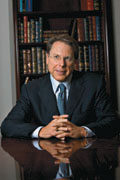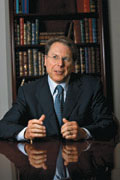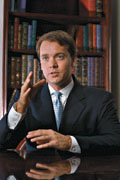America’s Freedom
Is Threatened On
Multiple Fronts




There was a time when politicians who attacked our Second Amendment freedom made no secret about it—they came at NRA and gun owners directly, with character assassination most often the preferred weapon of choice. Today, the assault on the Right to Keep and Bear Arms is no less real, but the war on our rights is being waged on multiple fronts, with new stealth strategies that seek to deceive and divide.
NRA Executive Vice President Wayne LaPierre and NRA-ILA Executive Director Chris Cox examine those strategies and the political landscape that faces gun owners leading up to Election Day, November 2.
How has the fight to protect Second Amendment rights changed most drastically?
Wayne LaPierre: Start with the Bipartisan Campaign Reform Act (BCRA). That law makes pre-election broadcasts of issue advertising by NRA a crime if our ads refer in any way to a politician running for federal office during the blackout period. And BCRA’s supporters aren’t stopping there. The next step is public financing of campaigns and requirements that television stations offer political candidates free air time. So the bottom line is that self-serving politicians want taxpayers—you and me—to fund attacks on our beliefs and at the same time cripple our capability to fight back.
Chris Cox: Our ability to reach the American people with the truth is what our enemies fear most, and we fought BCRA with everything we had all the way to the U.S. Supreme Court. Frankly, like millions of Americans, we were stunned that the court would split 5-4, and, in the words of Justice Scalia, “smile with favor upon a law that cuts to the heart of what the First Amendment is meant to protect: the right to criticize the government.” We’ve been forced to create new strategies to defeat this gag order on NRA’s right to be heard in the political arena.
How has BCRA affected the political process so far?
Wayne LaPierre: Now we see gun-hating billionaires such as George Soros—who, by the way, funded efforts to pass BCRA—being allowed to dump tens of millions of dollars into a political effort aimed directly at defeating President Bush. Soros can’t stand the fact that the Bush Administration stands squarely in the way of his dream of a global United Nations gun ban.
Chris Cox: You have to add to Soros’ personal billions the millions more he helps raise from deep-pocket donors on the far left. Then take Michael Moore and millions of dollars worth of publicity he has brought to war against President Bush and American gun owners, and you’ll see that our enemies are now funded in ways never dreamed of a short while ago.
Any another significant change in anti-gun strategy?
Wayne LaPierre: There is no underestimating the threat we face through the reckless lawsuits that the anti-gun lobby and greedy trial lawyers are bringing in an effort to bankrupt the American firearm industry. Given that we are a nation at war, this is unconscionable. It hardly matters that court after court, judge after judge has thrown out case after case, when the industry’s legal bills have run over $100 million and continue piling up. That means you and I have to pay more for a gun, more for a box of shells.
Chris Cox: The anti-gunners are misusing the courts to try to get what they can’t pass in Congress and state legislatures. Getting the “Protection of Lawful Commerce in Arms Act” to President Bush’s desk has been a top ILA priority. The House overwhelmingly passed the bill, and anti-gun Senators realized that they couldn’t defeat it. So they loaded it up with “poison-pill” amendments to make it unacceptable to Second Amendment supporters. John Kerry and John Edwards flew into town to cast their first votes of the year to defeat this legislation. Their votes mark them for the anti-gunners they are. Our job now is to make sure Kerry and Edwards can’t fool gun owners and hunters with deceitful campaign ads and phony photo-ops.
 |
| The election of President George W. Bush reversed Bill Clinton’s and Al Gore’s relentless attack on the Second Amendment rights of law-abiding citizens. |
You mentioned the courts, how do they factor into the national election?
Wayne LaPierre: The stakes in this election are enormous. Many court watchers think the President we elect in November may appoint as many as four U.S. Supreme Court justices, and, of course, a host of federal judges. Voters have a clear choice: either John Kerry, who says: “I believe in the right to bear arms as it has been interpreted in our country,” or George Bush, who says without qualification: “We stand for the Second Amendment, which gives every American the individual right to bear arms.” I don’t see how anyone who values our unique freedom to own a firearm can question for a second how to vote this time out.
Chris Cox: A recent Wall Street Journal editorial was right on the money. It said: “The voters should understand that in picking a President and Senate they’ll also be electing a judiciary that is (sadly but increasingly) a super-legislature.” To that I’d add that the very thought of John Kerry sending Supreme Court nominees before a Senate Judiciary Committee that includes gun banners Chuck Schumer, Dianne Feinstein, and Ted Kennedy, should make gun owners want to run to the voting booth.
And your final thoughts about the choices the nation’s voters face in November?
Wayne LaPierre: The differences are night and day. I go back to the U.N., and I remember John Kerry’s remark about U.S. presence in Iraq. He said, “I think you have to turn over to the United Nations genuine authority, ask them with a little humility to be involved . . . .” The notion of America bowing with “humility” to U.N. authority is the key to understanding what a John Kerry presidency would bring, especially if the anti-gunners pick up U.S. Senate seats in November. At stake in the 2004 elections is the very sanctity of the U.S. Constitution and America’s national sovereignty.
Chris Cox: I’d simply balance Wayne’s quote from John Kerry with a statement from Dick Cheney. The Vice President sounded a lot like President Reagan when he stated forthrightly: “The United States will never seek a permission slip to defend the security of our country.” There couldn’t be a greater contrast between the presidential tickets, and the stakes could not be higher. Freedom is on the ballot November 2.













 More Like This From Around The NRA
More Like This From Around The NRA



